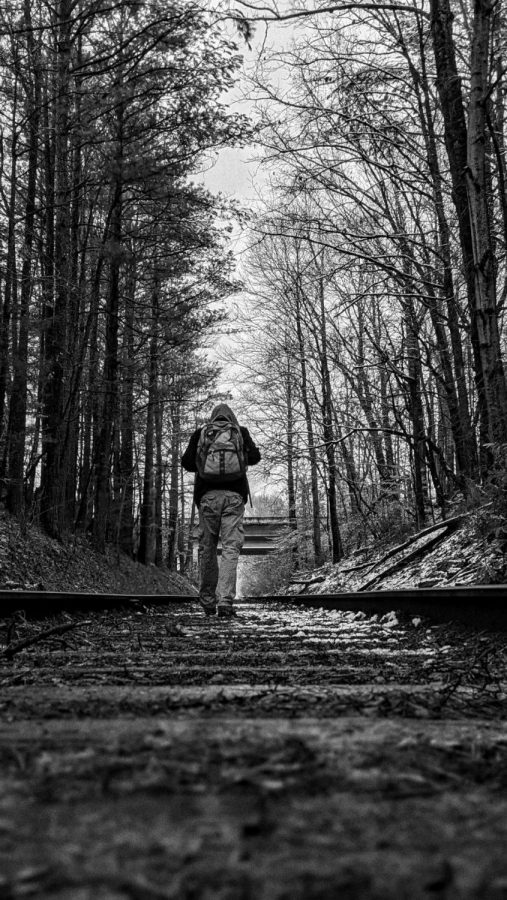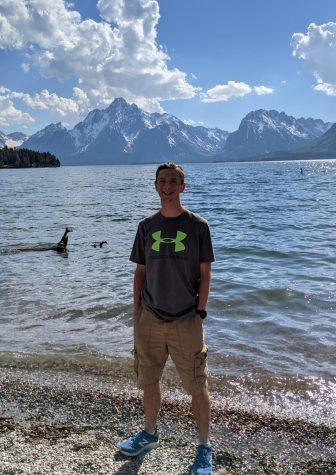The Slow-Burn Nightmare of “The Road”
March 11, 2021
Close your eyes. Now—imagine a world where everything you love is gone.
The environment is destroyed. Its beauty has been swallowed by endless devastation and wretched decay. Your hometown lies blanketed in ashes—transformed into ruins. Your family and friends are long since dead.
The skies are as gray as the ash that litters the devastated wasteland you once called home. Each day, the thought of death grasps your increasingly fragile mind. Yet, you fight on, grasping at some last glimmer of tentative hope, placing your faith in some vestige of salvation.
If you have reached the conclusion that this all sounds unabashedly bleak, then you’ve essentially summed up many of the works of Cormac McCarthy. McCarthy is a fantastically vivid and unrelentingly cynical writer. McCarthy’s stories often dwell on the absolute worst mankind can offer; his works are often proliferated by misery and violence.
His stories scarcely shy away from taboo or harrowing subject matter. However, his writing never comes across as pretentious or sensationalized. Rather, he just has a flair for writing plots and characters that fit well into such a bleak world view.
There is a sincerity and an honesty to the way he writes. And with his currently tenth and last finished novel, “The Road,” all of this culminates into something truly haunting.
The book follows a man and his son as they travel across the derelict ruins of what once was the United States. The country’s towns and environments have been completely wiped out by an ambiguous apocalypse. Their destination is the coast, with the hopes that something, anything, might remain there.
The complete ambiguity of the apocalypse allows Mccarthy to focus on the pure, raw emotion of the journey. His approach to writing is minimalistic, yet vivid and agonizingly sincere. His style of writing is often described as a “lyrical stream of consciousness,” due to its very free-form and non-traditional manner.
Throughout the novel, he ditches the fundamentals of writing structure and conventional punctuation, giving the story a persistently dreamlike, almost hazy quality. (A trait which I found very easy to read.) There is both a beauty that can be found in his writing; a nightmare both all too alien and yet, all too painfully familiar.
The core emotional tension throughout the story derives from the interactions between the boy, his father and their reactions to their environment. From the persistent lack of food to the father’s constant grapple with fear and paranoia to the consistent need to protect his son.
These themes of parenthood and protection appear very personal to Mccarthy. You could tell he was writing from a very deep, familiar place when creating the dialogue between the man and his son, their words reflecting the sparse wilderness they seem trapped in.
His characters exhibit real human reactions to such an overwhelming and hopeless scenario. The father’s grapple with paranoia, hostility and fear evolves gradually. But it is also through the son that the father comes to find hope and compassion.
Throughout the novel, the father tells the boy how they are “the good guys,” And seeing the boy reinforce this message of kindness is genuinely hopeful. The boy’s warmth begins to not only extend out to the father, whose experiences in the wasteland have left him demoralized. But also to many of those they encounter on the derelict road.
McCarthy strategically places small interludes of levity throughout the story, which gives both the characters as well as the readers a chance to breathe and take in the hopelessness of it all. It makes the personal moments seem warmer, and the darker moments all the more cold.
When it comes to violence, the novel doesn’t pull any punches. This unrelenting nature carries with it some of the most disturbing passages put into a dystopian story. The two leads face horror after horror. And many of the scenes have a tendency to leave their mark long after they are experienced.
“The Road” doesn’t hold your hand. It’s a literary puzzle, meant to be solved by one’s own perceptions and experiences. Through the grime and the misery, the fight for family and togetherness claws its way through the darkness of an often unrelentingly bleak world.
The willpower created from togetherness can create a fire meant to be carried into the dusk.
And through it all, as the father would put it, “This is what the good guys do. They keep trying.”





Sheri • Mar 15, 2021 at 8:54 am
Great review! Your descriptions give us just enough detail to want to (or not to want to) read this book…I don’t do well with these types of stories, so I will leave my knowledge of this experience in your hands.